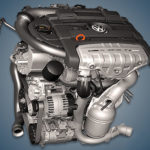The 1.4-liter Volkswagen CAVA 1.4 TSI engine was produced by the concern from 2008 to 2015 and was installed only on the basic modifications of the very popular Tiguan crossover. This power unit is essentially a EURO 5 version of the well-known motor with the BWK index.
The EA111-TSI series includes: CBZA, CBZB, BMY, BWK, CAVA, CAVD, CAXA, CDGA, CTHA.
Specifications
| Production years | 2008-2015 |
| Displacement, cc | 1390 |
| Fuel system | direct injection |
| Power output, hp | 150 |
| Torque output, Nm | 240 |
| Cylinder block | cast iron R4 |
| Block head | aluminum 16v |
| Cylinder bore, mm | 76.5 |
| Piston stroke, mm | 75.6 |
| Compression ratio | 10.0 |
| Features | DOHC |
| Hydraulic lifters | yes |
| Timing drive | chain |
| Phase regulator | on the intake shaft |
| Turbocharging | KKK K03 & Eaton TVS |
| Recommended engine oil | 5W-30 |
| Engine oil capacity, liter | 3.6 |
| Fuel type | petrol |
| Euro standards | EURO 5 |
| Fuel consumption, L/100 km (for VW Tiguan 2010) — city — highway — combined |
10.1 6.6 7.9 |
| Engine lifespan, km | ~260 000 |
| Weight, kg | 130 |
The engine was installed on:
- Volkswagen Sharan 2 (7N) in 2010 – 2015;
- Volkswagen Tiguan 1 (5N) in 2008 – 2015.
Disadvantages of the VW CAVA engine
- Many engine problems are related to detonation due to the quality of the fuel consumed.
- Bad gasoline simply cracks pistons and many replace them with forged ones.
- The intake valves here quickly overgrow with soot and the compression in the cylinders drops.
- The timing chain has changed many modifications, but it rarely runs more than 100,000 km.
- The turbine often fails the electronic control valve, as well as its wastegate.
- The source of the coolant leak is most often located in the intercooler area.






